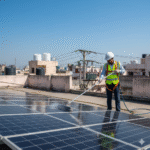As energy costs continue to rise and environmental awareness grows, more homeowners and businesses are turning to solar energy as a smart, long-term investment. While the upfront cost of installing solar panels can seem significant, the financial benefits over time are substantial. Solar energy not only reduces your monthly electricity bills but also increases property value, provides protection against rising energy costs, and can even generate income through government incentives and net metering programs.
One of the most immediate ways solar energy saves you money is by reducing or even eliminating your electricity bills. Once your solar system is installed, it starts producing free energy from the sun. The electricity generated by your solar panels directly powers your home or business, meaning you buy less power from the utility company. Over time, these savings add up — especially in areas with high electricity rates. In many cases, solar users can cut their monthly bills by 50% or more, and some even achieve net-zero energy costs.
Another key financial advantage of solar energy is its ability to protect you from fluctuating energy prices. Traditional energy costs are tied to fossil fuel markets, which can be unpredictable. With solar panels, you produce your own electricity and are less dependent on utility rate hikes. This energy independence provides long-term financial stability and predictability for your household or business.
Solar energy also offers significant government incentives and tax benefits. Many countries and regions provide tax credits, rebates, or grants to encourage the adoption of renewable energy. For example, homeowners in the U.S. can take advantage of the federal solar investment tax credit (ITC), which allows you to deduct a portion of the installation cost from your taxes. Local governments and utilities may also offer additional rebates, making the initial investment more affordable and accelerating your return on investment.
Over time, solar panels also add value to your property. Studies have shown that homes equipped with solar systems sell faster and at higher prices compared to those without. Potential buyers are often attracted to lower utility bills and the environmental benefits of solar energy, making your property more appealing on the market.
Finally, if your solar system produces more electricity than you use, net metering programs allow you to sell that excess energy back to the grid. This means you can earn credits or payments from your utility company, further offsetting your costs and boosting your overall savings.
In the long run, solar energy is not just an environmentally conscious choice — it’s a financially wise one. With lower energy bills, stable costs, valuable incentives, and an increase in property value, the savings continue to grow year after year. Investing in solar power means investing in your financial future while contributing to a cleaner, more sustainable planet.
Would you like me to make this blog a bit more SEO-optimized (e.g., include keywords like solar panel savings, reduce electricity costs, solar investment benefits, etc.) so it performs better online?





